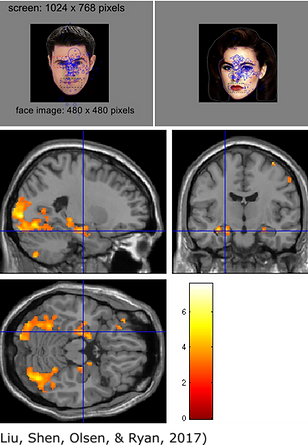Current research themes
Students are encouraged to discuss with Dr. Liu their own research interests. If the research question is beyond the expertise of the lab, external expertise can be obtained through collaborations.
Our current research focuses on the question of how the medial temporal lobe, especially the hippocampus, encodes visual memory.
The literature has shown that the hippocampus plays a key role in supporting memory processing. However, how different types of information is transformed and registered (or indexed) in this brain structure is still unclear.
We are approaching this question from a few different angles.
1
Recently we have found that when we explore the visual world with more eye-gaze fixations, our hippocampus will show a stronger activity (Liu, Shen, Olsen, & Ryan, 2017). This visual exploration – hippocampal activity coupling becomes weaker during aging (Liu, Shen, Olsen, & Ryan, 2018).
These findings may suggest that visual information sampled by gaze fixations needs to be integrated into the hippocampus in real time to form memory representations. If so, memory engrams formed at any moment are likely to be in much smaller units (i.e., single fixation information), compared to the final memory products (e.g., objects, scenes, events, etc.).
Currently, we are exploring how visual information sampled across fixations can be integrated into memory, using fMRI, EEG, eye-tracking, and machine learning methods.
2
The medial temporal lobe, especially the hippocampus, can support our detailed episodic memory. It has been shown that different visual categories (faces, scenes, etc.) or features (color, movement, etc.) are processed in relatively different posterior brain regions.
Do different parts of the hippocampus play a different role in supporting different visual categories? How can we decode the visual categories/features in different memory regions in the medial temporal lobe? To what extent is the functional information transformation consistent with anatomical connections?
One of our current research goals is to examine how these perceptual features are transformed and registered as memory representations in the hippocampus.
3
We are also interested in individual differences in hippocampal functioning from the perspectives mentioned above.
One focus of this research program is to examine age-related memory declines. Another focus is on individual differences in healthy young adults.
We are interested in questions such as to what extent young healthy adults are different in visual memory encoding and what are the underlying cognitive and neural mechanisms for the individual differences.

Research on neural plasticity is conducted through collaborations with Dr. Steven Woltering at the Texas A&M University and Dr. Rosemary Tannock at the University of Toronto.
